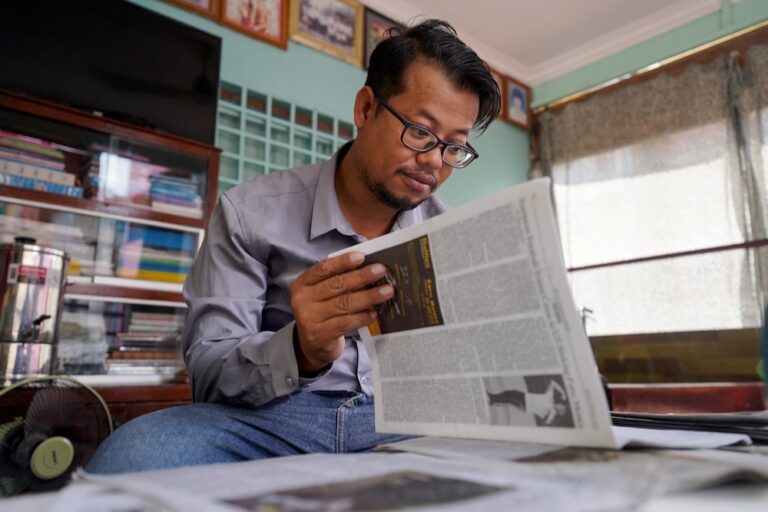The theme of Human Rights Day 2019 is “Youth Standing Up for Human Rights.”
This statement was originally published on cchrcambodia.org on 10 december 2019.
On 10 December every year, Human Rights Day is celebrated across the world to commemorate the adoption of the Universal Declaration of Human Rights (“UDHR”). In Cambodia however, this year has seen concrete actions taken to hinder celebrations and to restrict the peaceful exercise of human rights. We call on the RGC to encourage the celebration of Human Rights Day in Cambodia and acknowledge the benefit human rights have on society as a whole. We implore the RGC to cease all arbitrary action and targeting of human rights defenders who selflessly dedicate their lives to fight for the protection of human rights for all.
This year, the decision was made to remove Human Rights Day as a public holiday in Cambodia as of 2020 – a decision criticized as discouraging Human Rights Day celebrations. Furthermore, while some celebrations were permitted, some communities across Cambodia were refused permission by the authorities to gather and celebrate. These concerning actions to hinder Human Rights Day celebrations unfold in a context of narrowing civic space and increasing pressure on those exercising their fundamental freedoms.
Since 2017 there has been a noted neglect of human rights and fundamental freedoms and in 2019 alone violations of freedom of expression and association soared due to a crackdown on those perceived to be affiliated with the political opposition, triggered by the announced return of the former-opposition leader. While the severe surge in harassment of those perceived to be affiliated with the Cambodia National Rescue Party (“CNRP”) may have subsided with the uneventful passing of 9 November, many political prisoners remain unjustly detained and face baseless charges, illustrating that political freedom remains unduly fettered across Cambodia.
This year has also borne witness to the targeting of the free media with the ongoing judicial harassment of ex-Radio Free Asia journalists Yeang Sothearin and Uon Chhin, and instructions from the Ratanakiri provincial governor that all reporters must present themselves to the provincial Department of Information before being permitted to report in the province. Along with the impending amendments to the Press Law and the proposed Anti-Cybercrime Law, press freedom in Cambodia faces serious threats.
These concerning developments that blemish 2019, send a clear message that dissent, political or otherwise, is not permitted in Cambodia, encouraging self-censorship and debunking any illusion that citizens can think and act freely without fear of repercussion.
The issue of land rights persists as a concern across the country with 66 land-related protests recorded so far this year. As the prevalence of land grabs continue, so does the lack of action to bring justice for victims. In 2019 the 15-year Borei Keila land dispute continued as what remains of the site was demolished, leaving residents without a home as well as without sufficient compensation or settlement.
Fair trial rights too received insufficient respect, with the treatment of Kem Sokha being a prime example. He was detained, either in prison or under de facto house arrest for a total of two years and two months, illustrating a use of pre-trial detention that amounts to an unlawful deprivation of liberty. Furthermore, Kem Sokha’s presumption of innocence – as guaranteed under international and domestic law – has already been compromised by his treatment as a convicted criminal for the past 26 months. Kem Sokha’s case is but one example of a campaign of actions taken against human rights defenders and activists across the country for peacefully exercising their human rights and fundamental freedoms.
These human rights abuses are not unique, but rather have been a pattern over the last few years. The demonstrated series of crackdowns on individuals and groups, ranging from political parties and CSOs to the free media and social media users, is highly alarming. As a duty bearer with the obligation to respect, protect and fulfil human rights and fundamental freedoms, the RGC must address the concerning human rights situation and it must do so autonomously out of true commitment to fulfil its own obligations.
The RGC has however positively engaged in promoting Sexual Orientation, Gender Identity and Expression and Sex Characteristics (“SOGIESC”) rights this year. The RGC committed to implementing all nine of Cambodia’s third cycle Universal Periodic Review recommendations regarding the rights of Lesbian, Gay, Bisexual, Transsexual, Intersex and Queer (“LGBTIQ”) individuals. Although it is encouraging to see these recommendations being accepted, it is imperative that this will translate into concrete actions by the RGC. While this positive development ought to be acknowledged, this selective treatment is however, insufficient. Human rights are fundamentally universal and therefore the RGC must respect, protect and fulfil the human rights of everyone equally. The RGC should commit to making positive human rights developments for all citizens universally, not just a select group.
In the face of increased difficulties, the continued activism of individuals, groups and communities to uphold human rights in Cambodia shows a resilience and commitment that should be celebrated. The theme of Human Rights Day 2019 is “Youth Standing Up for Human Rights.” Their participation in activism over the coming years is critical to positive change in Cambodia and it is to their futures we should dedicate our work. Empowering them to know and claim their rights should be central to our missions.
Chak Sopheap, Executive Director of CCHR: “We celebrate Human Rights Day today, to reignite our commitment to the promotion and protection of all human rights and fundamental freedoms. This day serves as a much needed reminder that fundamental and inalienable human rights are integral to our society. We encourage the RGC to embrace Human Rights Day celebrations and utilize this day to celebrate and empower those who work to improve the situation of human rights in Cambodia.”



